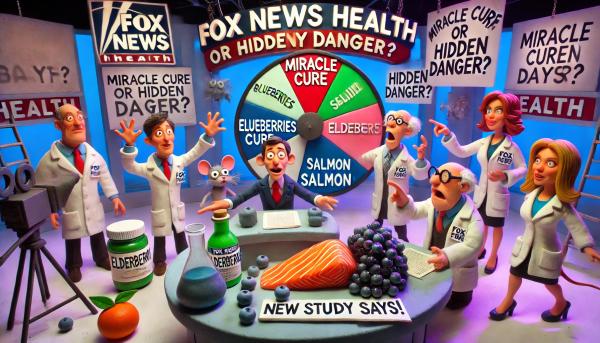
It’s common sense that good dietary habits have a wide variety of benefits, and the more you deviate from good lifestyle choices, the more carnage on your health will occur. This has been the persistent talking point of public health education programs for decades, most of which have fallen on the deaf ears of most Americans, as evidenced by our health and fitness status.
Instead of focusing on the obvious reasons for many Americans' “chronic disease,” our poor lifestyle choices, the media provides a podium for every ‘study’ which turns a non-threat into a threat, a mouse into an elephant, or something good into something magical, making their articles more like reruns of the Dr. Oz show than science reporting.
When it comes to science reporting, the extensive media nonsense is related to specific failings.
- Including irrelevant details or omitting key information.
- Relying on press releases that exaggerate findings instead of reading and understanding the actual study.
- Failing to report the study was conducted on rodents and to recognize the Principle of Toxicology—the dose makes the poison, not the chemical.
- Lacking a background in science or science communication makes it hard to separate real from junk science
- Reporting on observational studies as if they prove cause and effect rather than only showing an association.
- Failing to recognize that a single study means nothing without replication.
- Overlooking small or unrepresentative sample sizes that make findings unreliable.
- Highlighting scary carcinogen claims without a plausible biological mechanism.
- Quoting "experts" who are as uninformed as the journalists themselves.
Let’s use two recent Fox News articles as an example because I just read this source more often than others. However, it applies to all media outlets that use English majors/journalists with no science background to report on science issues.
“Make America Healthy Again: The Powerhouse Foods That Work Medical Magic.”
The article's sources of advice were “a chiropractor and doctor of natural medicine” and two nutritionists, one of whom identifies as a holistic nutritionist, whose background for science insight can be elaborated on here, here, and by ACSH’s Katie Suleta. The other expert, with the appropriate credentials, promotes herself as a “renowned dietician and thought-leader…steering people towards wellness strategies.”
The Fox report states:
- The elderberry is “an incredible immunity buster,” whatever that means.
- “Berries are great antioxidants that can help lower sugars, especially fructose in the liver.” Of course, anything with the magic word antioxidant becomes magical to food cultists. The problem is that all fruits and vegetables contain them, and they are not the magical compounds they are often portrayed as. Additionally, the liver already metabolizes 70% of dietary fructose, so why would you think consuming a handful of berries containing 24 mg/g to 44 mg/g of fructose will enhance this?
- They refer to a Washington State University study that provides evidence that elderberry juice could be a tool for weight management and improving metabolic health. However, there is no link to the study. In this study, which I assume is the one being cited, 18 volunteers drank a glass of elderberry juice daily for a week. The study's authors compared elderberry juice to a placebo group, and they specifically stated, “Follow-up investigation is needed to confirm our findings and to test for longer durations.”
- “I want everyone to have salmon,” due to the magic of omega-3 fatty acids. I believe we now have over 8 billion people in the world. Do we have that many salmon available? I hate salmon; someone can have mine.
Brain And Memory Are Boosted By Eating One Particular Diet, Study Finds.
- Fox News refers to a study on 10 rats eating the rodent equivalent of the Mediterranean diet for 14 weeks, followed by a behavioral assessment extrapolating the results to humans.
- In the study, researchers “found that subjects following a Mediterranean diet developed distinctly different gut bacteria patterns than those eating a typical Western diet. These bacterial changes correlated with better memory and cognitive performance.” Gut microbes are extensively and regularly purged and have the ability to double in number within one hour, depending upon your food choices, but to suggest that this short-term change in gut bacteria directly correlates to improved cognitive skills over 14 days is flawed reasoning.
- In another study of the Mediterranean diet, researchers found “as compared to a Western diet, the Mediterranean diet was associated with a higher number of anal gas evacuations, sensation of flatulence and larger volume of gas after the meal.” Will flatulence become an indirect biomarker of cognitive skills and intelligence? A literature search provided nothing, but it may be a Fox News health headline soon.
- “Researchers using animal models are susceptible to a fallacy known as false analogy, where inferences based on assumptions of similarities between animals and humans can potentially lead to an incorrect conclusion. ” - Espen A.Sjoberg Simply put, you cannot directly apply animal experiments to humans.
Science reporting should inform, not mislead. When media outlets rely on sensationalism, dubious experts, and incomplete interpretations of research, they undermine public understanding of health and medicine. Readers would be wise to treat health headlines with a hefty dose of skepticism.



